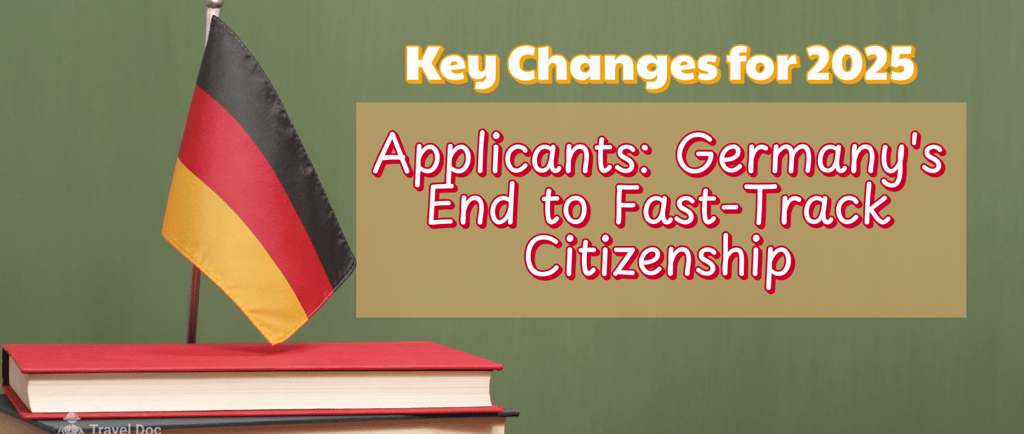Key Changes for 2025 Applicants: Germany's End to Fast-Track Citizenship
The German government has announced the termination of the three-year fast-track citizenship pathway for immigrants, a significant development. The new administration has repealed this pathway, which was introduced just last year and facilitated the application for German citizenship for well-integrated individuals in a reduced time frame.


The 3-year fast-track citizenship route for well-integrated immigrants is being abolished by Germany's new coalition government. Although the five-year path and dual citizenship regulations persist, the decision signifies a change in the nation's approach to naturalization.
The German government has announced the termination of the three-year fast-track citizenship pathway for immigrants, a significant development. The new administration has repealed this pathway, which was introduced just last year and facilitated the application for German citizenship for well-integrated individuals in a reduced time frame.
The change is a result of the recently signed coalition agreement between the conservative Christian Democratic Union (CDU) and the Christian Social Union (CSU) bloc and the Social Democratic Party (SPD). It substitutes for the reforms implemented by the previous SPD-Green-FDP government in 2024.
What was Germany's three-year fast-track citizenship route?
The three-year naturalization option was intended for immigrants who were thoroughly integrated and:
Demonstrated proficiency in the German language at the C1 level
Actively participated in German society by engaging in volunteer work, achieving professional success, or achieving academic success.
It was designed to incentivize individuals who exhibited a profound dedication to the German way of life. Immigrants who had spent years studying or working in the country were particularly fond of the route.
Nevertheless, the CDU and CSU's critics referred to it as "turbo naturalization," contending that three years was insufficient to achieve complete integration and citizenship.
What Are the New Citizenship Requirements in Germany?
Germany continues to provide routine naturalization after five years, a process that was simplified by the reforms of last year, despite the termination of the fast-track option. Applicants are required to:
For a minimum of five consecutive years, reside in Germany.
Demonstrate German language proficiency at the B1 level.
Demonstrate social integration through community involvement, education, or employment.
Although this five-year citizenship path is longer than the fast-track, it still represents a more contemporary and accessible approach than the previous eight-year rule.
Germany's dual citizenship will endure.
One significant change is here to stay: dual citizenship, despite the revocation of the 3-year option.
Prior to the 2024 reform, Germany generally prohibited dual citizenship for individuals who were not citizens of the European Union. However, the new law eliminated this restriction, enabling immigrants to maintain their original nationality upon becoming German citizens.
A victory for communities such as the Turkish diaspora, which has long advocated for this privilege, has been achieved by the new coalition's confirmation that it will not reverse this decision.
Dual nationals are not subject to citizenship revocation.
Another headline from the coalition agreement: dual nationals will not be subject to citizenship revocation, even in cases involving extremist affiliations.
The CDU/CSU had previously advocated for legislation that would permit Germany to deprive dual citizens of their nationality if they subscribed to anti-democratic ideologies, antisemitism, or terrorism. Nevertheless, the SPD was adamantly opposed to this concept.
Rather, the government will contemplate more stringent deportation measures for non-citizens who violate Germany's constitutional values, without affecting naturalized citizens.
Implications for German Immigrants
Prospective citizens are impacted by the proposed modifications in the following manner:
Policy Area Status Effect
The three-year fast-track citizenship program has been abolished. There is no accelerated path for highly integrated individuals.
The five-year citizenship: route remains in effect. The typical course of action for the majority of immigrants
Dual nationality: Remains are permissible. Applicants have the option to maintain their original nationality.
Revocation of Citizenship: Not pursued Applicants have the option to maintain their original nationality.
Conclusion: A Slower, But More Equitable, Route to German Citizenship
The decision by Germany to discontinue the fast-track citizenship route may be disheartening for numerous well-integrated immigrants who were anticipating a more expedited path to belonging. The five-year residency rule and dual citizenship, however, continue to indicate progress.
The new policies are a meticulous attempt to maintain impartiality without compromising societal values by striking a balance between national identity and integration.
It is now more crucial than ever for immigrants who are contemplating naturalization to comprehend the current pathways and prepare exhaustively for the application process.
Connect with us on LinkedIn, Twitter, and Facebook.
